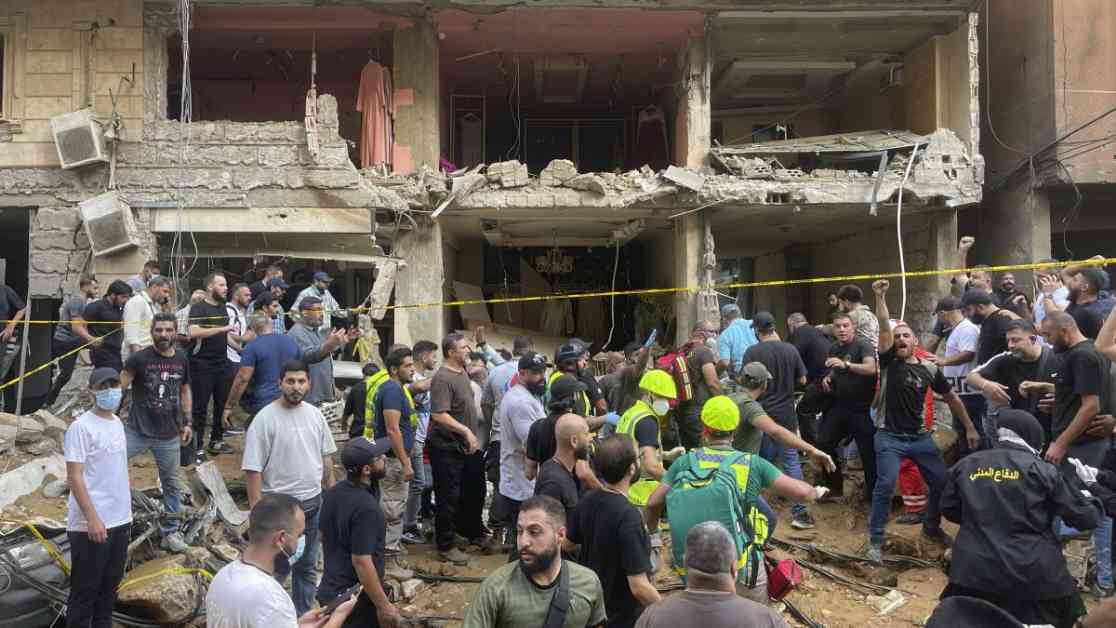Israel’s recent strike on a Beirut suburb amidst escalating tensions with Hezbollah has left at least 14 people dead and 66 others wounded, according to Lebanese authorities. This attack comes on the heels of a series of bombings across Lebanon, which resulted in 30 fatalities and thousands of injuries. The bombings, believed to be orchestrated by Israel, have sparked outrage and retaliation from Hezbollah, culminating in a cycle of violence that threatens to engulf the region in a wider conflict.
Israel’s Airstrikes
The Israeli military launched airstrikes targeting the Radwan Force, Hezbollah’s special forces, in a crowded Beirut suburb during rush hour. The strikes also aimed at senior military commander Ibrahim Aqil, who is closely associated with Hezbollah leader Hassan Nasrallah. Aqil has been accused by the U.S. of orchestrating the deadly bombings of U.S. Marines in Lebanon in the 1980s. The attack resulted in the collapse of at least two residential buildings in the southern suburbs of Beirut, where Hezbollah is headquartered.
The scene in Dahieh, the targeted area, was chaotic, with family members rushing to the site but being kept away by Hezbollah operatives. Ambulances, fire trucks, and rescue crews worked tirelessly to search for survivors and clear the rubble. The Lebanese civil defense urged residents to evacuate the area, as the extent of the damage became apparent. The residential buildings that collapsed housed families and businesses, leading to a devastating impact on the community.
Renewed Clashes
The recent clashes between Israel and Hezbollah have reignited tensions that have been simmering for months. Hezbollah’s increased cross-border attacks in solidarity with Hamas and Palestinians in Gaza have drawn a swift and aggressive response from Israel. Israeli military officials have signaled a more confrontational stance towards Hezbollah, with Defense Minister Yoav Gallant declaring a “new phase” in the conflict. The escalation of violence has raised concerns about the potential for a full-scale war in the region.
U.S. officials have been actively engaged in diplomatic efforts to de-escalate tensions and prevent a further deterioration of the situation. Despite these efforts, the conflict between Israel and Hezbollah has escalated, with both sides showing a willingness to engage in military confrontations. The Biden administration has reiterated its commitment to finding a diplomatic solution to the crisis, emphasizing the need for dialogue and negotiation to avoid a disastrous outcome.
Diplomatic Efforts
The ongoing violence in the Middle East underscores the complex and volatile nature of the region’s political landscape. The intertwined relationships between Israel, Hezbollah, and other regional players create a powder keg situation that threatens to explode at any moment. The U.S. has a vested interest in maintaining stability in the region, as any escalation of conflict could have far-reaching consequences for global security.
As the situation in the Middle East continues to deteriorate, the international community must redouble its efforts to prevent further bloodshed and destruction. Dialogue, negotiation, and diplomatic engagement are essential tools for resolving conflicts and building lasting peace in the region. The recent escalation between Israel and Hezbollah serves as a stark reminder of the urgent need for a comprehensive and inclusive approach to conflict resolution in the Middle East.
In conclusion, the recent violence in Beirut and the escalating tensions between Israel and Hezbollah highlight the precarious state of affairs in the Middle East. The international community must prioritize diplomacy and dialogue to prevent a further escalation of conflict and work towards a sustainable peace in the region. The lives of innocent civilians hang in the balance, and it is incumbent upon all parties involved to act responsibly and seek peaceful solutions to the current crisis.



























